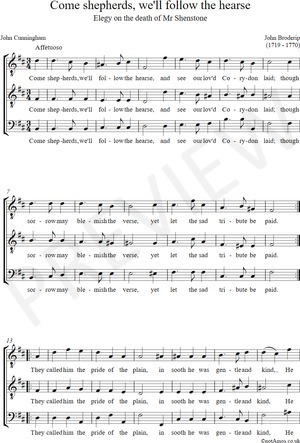 notAmos Performing Editions 1 Lansdown Place East, Bath BA1 5ET, UK +44 (0) 1225 316145 Performing editions of pre‑classical music with full preview/playback and instant download |
John Broderip
(1719 - 1770)
Elegy on the death of Mr Shenstone
(T.T.B.)
Full score (PDF), €0.00 for unlimited copies Download this item(1719 - 1770)
Elegy on the death of Mr Shenstone
(T.T.B.)
Printable cover page (PDF), €0.00 for unlimited copies Download this item
If you have any problem obtaining a PDF, please see our help page. If that does not resolve the issue, please click here.

This work, Broderip : Elegy on the death of Mr Shenstone : scoreid 145372, as published by notAmos Performing Editions, is licensed under a Creative Commons Attribution-ShareAlike 4.0 International License. All relevant attributions should state its URL as https://www.notamos.co.uk/detail.php?scoreid=145372. Permissions beyond the scope of this licence may be available at https://www.notamos.co.uk/index.php?sheet=about.
| Enquire about this score |
| About John Broderip |
| Full Catalogue |
| About us | Help, privacy, cookies |
| About John Broderip |
| Full Catalogue |
| About us | Help, privacy, cookies |
John Broderip was perhaps the most prominent member of a dynasty of west country musicians. He was organist at Wells Cathedral (succeeding his father) and published psalmody and glees. This glee comes from his collection of six (Op. 5), c.1770.
Cunningham's elegy was to William Shenstone, poet and pioneer practitioner of landscape gardening. Thomas Arne also set a portion of the elegy as a glee.
Lyrics: John Cunningham
Come shepherds, we'll follow the hearse,
We'll see our loved Corydon laid;
Though sorrow may blemish the verse,
Yet let the soft tribute be paid.
They called him the pride of the plain,
In sooth he was gentle and kind;
He marked in his elegant strain
The graces that glowed in his mind.
On purpose he planted yon trees,
That birds in the cover may dwell;
He cultured his thyme for the bees,
But never would rifle their cell.
Ye lambkins that play at his feet
Go bleat - and your master bemoan;
His music was artless and sweet,
His manners as mild as your own.
No verdure shall cover the vale,
No bloom on the blossoms appear,
The sweets of the forest shall fail
And winter discolour the year.
No birds in our hedges shall sing,
Our hedges so vocal before;
Since he that should welcome the spring
Can hail the gay season no more.
His Phillis was fond of his praise
And poets came round in a throng.
They listened, and envied his lays,
But which of them equall'd his song?
Ye shepherds, henceforward be mute,
For lost is the pastoral strain;
So give me my Corydon's flute,
And thus let me break it in twain.
Come shepherds, we'll follow the hearse,
We'll see our loved Corydon laid;
Though sorrow may blemish the verse,
Yet let the soft tribute be paid.
They called him the pride of the plain,
In sooth he was gentle and kind;
He marked in his elegant strain
The graces that glowed in his mind.
On purpose he planted yon trees,
That birds in the cover may dwell;
He cultured his thyme for the bees,
But never would rifle their cell.
Ye lambkins that play at his feet
Go bleat - and your master bemoan;
His music was artless and sweet,
His manners as mild as your own.
No verdure shall cover the vale,
No bloom on the blossoms appear,
The sweets of the forest shall fail
And winter discolour the year.
No birds in our hedges shall sing,
Our hedges so vocal before;
Since he that should welcome the spring
Can hail the gay season no more.
His Phillis was fond of his praise
And poets came round in a throng.
They listened, and envied his lays,
But which of them equall'd his song?
Ye shepherds, henceforward be mute,
For lost is the pastoral strain;
So give me my Corydon's flute,
And thus let me break it in twain.
